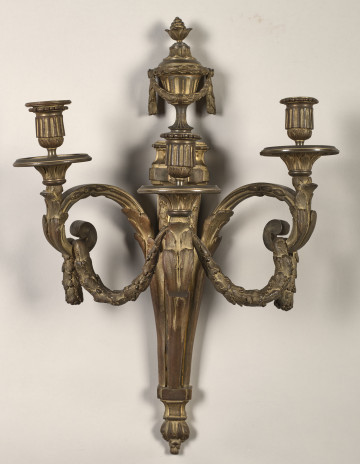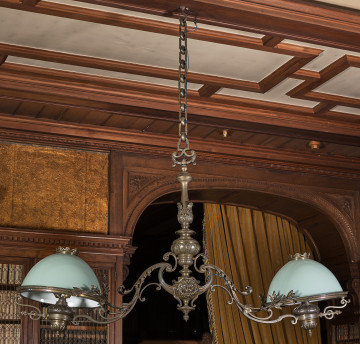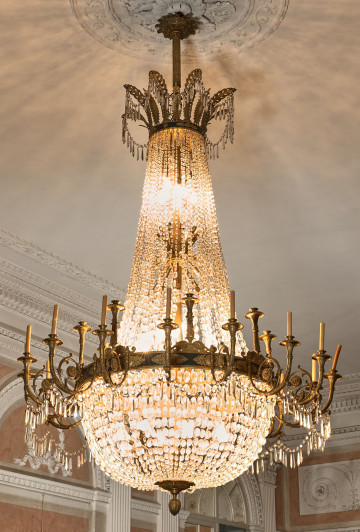
Wall lamp
19th (?) century
Castle Museum in Łańcut
Part of the collection: Lamps, chandeliers and sconces
The chandelier in the Billiard Room in the first floor of the castle stems from the collection of the Potoccy family; it is made of crystal glass and stems most likely from the end of the 19th century. It is most likely English, and is electrified, for 18 candles, and has two levels. The structural components are made of metal, ending in milky glass sleeves, with candles on round bobeches made of thin glass with gilded edges. In light bulbs, the light is emitted by a tungsten filament, heated by the flow of electric current. The second level is made up of six arms, bent to shape, ground and finished diagonally with sleeves holding light bulbs. The entire chandelier (from the top all the way to the lower arms) is decorated with twelve pieces of cord with rectangular stair-ground crystals. The trunk and arms are decorated with vertical, triangle-shaped pendants. The chandelier is a type of candle holder fixed to the ceiling of a room. Its history reaches back to the middle ages, where in sacral art, and castles, it was used to light large rooms. These were fairly simple structures shaped as wooden crosses fixed to ceilings, with arms, on which candles were placed. Cross-type chandeliers were wooden, and as time passed, such objects started to be made of wrought iron, shaped as circles, and bronze. Round, or circular, chandeliers, were based on wheels, where the arms holding candles were fixed to the rim; as time passed, they became richly decorated with crystal pendants.
Other names
Chandelier
Author / creator
Object type
Lamps, chandeliers and sconces
Technique
mill forming
Material
metal, crystal
Origin / acquisition method
decyzja administracyjna
Creation time / dating
Creation / finding place
Owner
Castle Museum in Łańcut
Identification number
Location / status

19th (?) century
Castle Museum in Łańcut

19th (?) century
Castle Museum in Łańcut

19th (?) century
Castle Museum in Łańcut
DISCOVER this TOPIC
National Museum in Szczecin
DISCOVER this PATH
Educational path